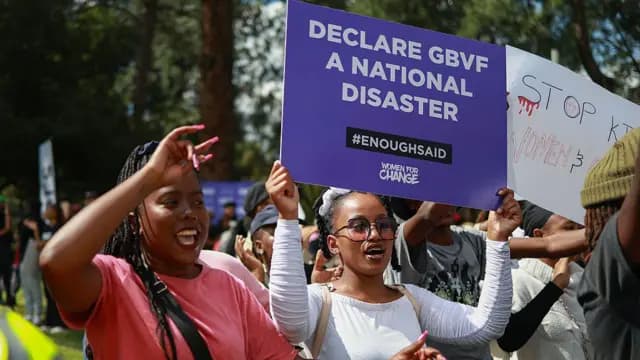We're loading the full news article for you. This includes the article content, images, author information, and related articles.
As South African women stage a nationwide shutdown demanding an end to femicide ahead of the G20 Summit, their protest highlights a shared, grim reality of gender-based violence that continues to plague Kenya and the broader region.

JOHANNESBURG, SOUTH AFRICA – Streets across South Africa are expected to fall silent on Friday, 21 November 2025, as women's rights organizations lead a nationwide strike to protest the country's staggering levels of gender-based violence (GBV). The movement, known as the "G20 Women's Shutdown," calls for women to withdraw from the economy for one day by staying home from work and school, and to wear black in a powerful display of mourning and resistance. The protest, organized by the civil society group Women for Change, is timed to capture global attention just before Johannesburg hosts the G20 Leaders' Summit on 22-23 November 2025.
The campaign has seen a groundswell of support on social media, with users across the continent turning their profile pictures purple to express solidarity. At 12:00 PM EAT (12:00 PM SAST), participants are urged to lie down for 15 minutes, a somber tribute to the high number of women murdered daily in the country. The central demand of the protestors is for the South African government to declare GBV and femicide a national disaster, a call that has been echoed by over one million petition signatories.
The crisis fueling the South African protests resonates deeply in Kenya, where the fight against GBV is an ongoing battle. The statistics from both nations paint a harrowing picture of the dangers women face. In South Africa, the femicide rate is reported to be five to six times the global average. Between July and September 2024 alone, 957 women were murdered, and over 10,000 rapes were reported, according to data released by the Human Sciences Research Council (HSRC) on 8 August 2025. The South African Police Services (SAPS) recorded 13,453 sexual offences between January and March 2025.
This mirrors the dire situation in Kenya. On 19 December 2024, the Kenyan government declared GBV the nation's most pressing security threat, revealing that 100 women had been killed in the preceding four months. Between September 2023 and December 2024, a staggering 7,107 cases of sexual and gender-based violence were reported in Kenya. According to the Kenya National Bureau of Statistics' 2023 Demographic and Health Survey, 34% of ever-married women have experienced physical violence from a partner. Organizations like Femicide Count Kenya reported 152 such murders in 2023, though activists believe the true number is much higher due to underreporting.
Both governments have faced criticism for their responses. South African President Cyril Ramaphosa has repeatedly condemned the violence, acknowledging it as a "war being waged on our sisters." On Thursday, 20 November 2025, ahead of the protests, President Ramaphosa announced that GBV would be classified as a national crisis. His administration has pointed to the establishment of 92 dedicated Sexual Offences Courts since 2013 and plans to overhaul the national offenders register as signs of progress.
However, activists argue that implementation remains weak and lacks urgency. The call to declare it a national disaster, which was recently declined by the National Disaster Management Center, is seen as a necessary step to unlock critical resources and political will.
In Kenya, public outrage over a surge in femicide cases led to nationwide protests in early 2024 and again in late 2024. In response, President William Ruto's administration approved the formation of a presidential working group in December 2024 to tackle the issue. Furthermore, in May 2025, the State Department of Gender and Affirmative Action validated a revised National Policy on Prevention of and Response to GBV. Despite these policy moves, organizations like FIDA-Kenya and the Centre for Rights Education and Awareness (CREAW) continue to highlight significant barriers to justice, including victim-blaming and slow investigations.
The purple-hued protests in South Africa are more than a national outcry; they are a reflection of a continental crisis demanding immediate and systemic intervention. The parallels with Kenya's struggle underscore the deep-rooted nature of gender inequality and violence that transcends borders. As activists in Johannesburg challenge world leaders at the G20 to acknowledge that economic progress is impossible when half the population lives in fear, their message is a stark reminder for leaders in Nairobi and across Africa that policy pronouncements must be matched with decisive, funded, and sustained action to protect the lives of women and girls.
Keep the conversation in one place—threads here stay linked to the story and in the forums.
Sign in to start a discussion
Start a conversation about this story and keep it linked here.
Other hot threads
E-sports and Gaming Community in Kenya
Active 9 months ago
The Role of Technology in Modern Agriculture (AgriTech)
Active 9 months ago
Popular Recreational Activities Across Counties
Active 9 months ago
Investing in Youth Sports Development Programs
Active 9 months ago
Key figures and persons of interest featured in this article